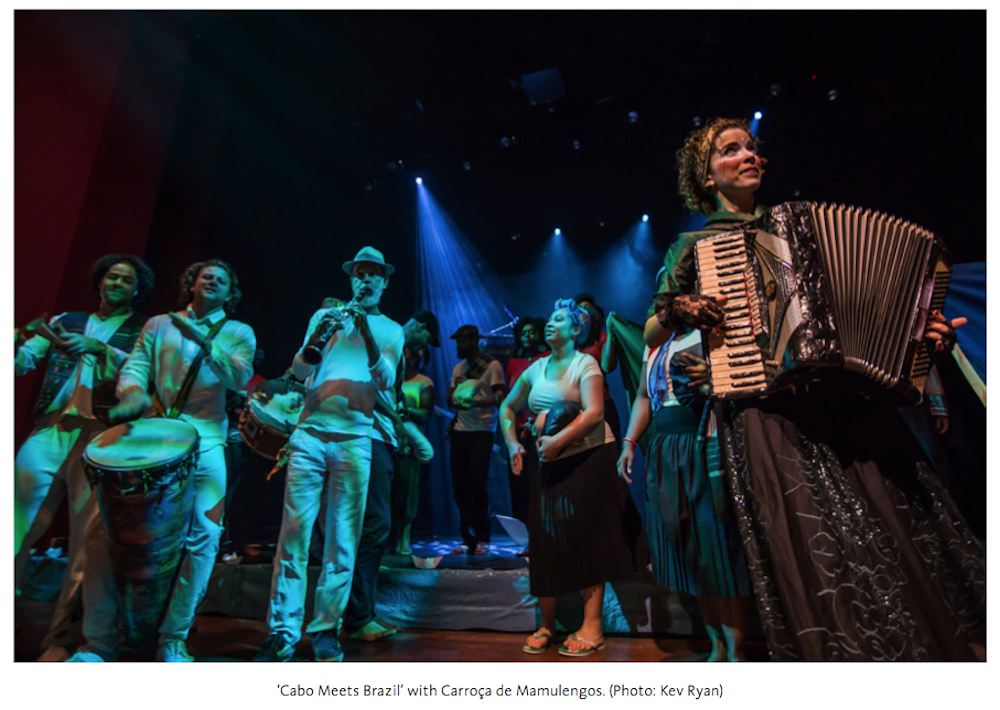We introduce Maria Gomide and her family. She is the artistic coordinator of an extraordinary travelling performance company from Brazil called Carroça de Mamulengos, which means something like ‘wagon full of puppets’. The company was founded in 1977 by Maria’s father and today encompasses three generations of family members.
We first met Maria in early May 2016 when we were in in São Paulo scouting for artists to teach at our very first ICAF summer school. She convinced us with her enthusiasm, charm, and genuine passion to discover the community arts world outside of Brazil – and with her wide variety of skills and sheer limitless energy. Maria came to Holland in August 2016 and impressed everyone who had the good fortune to participate in the module she taught at our summer school. Her inspiring presence in our country motivated us to ask her back and work with the Cape Verdian community of Rotterdam. With her mother, one of her sisters and one of her brothers she arrived early March 2017. Immediately after their landing they embarked on a whirlwind enterprise that literally touched the lives of hundreds of Cape Verdians. Many of them appeared on the main stage of Zuidplein theatre at the end of our festival, along with a number of Brazilian musicians, provided food, or sat with friends and family in the sold out auditorium. The many souls the Carroça artists affected during their ICAF residency are a testimony to the deeply caring, generous approach they adopt in their community work in Brazil. In the video, Maria shows you around their house in Juazeiro do Norte in Northeastern Brazil and explains that the Covid-19 pandemic, which is ravaging particularly the poorer quarters in her country, has also stopped all their outdoor community activities. Instead, Carroça has started a series of short educational YouTube video segments, featuring herself and her daughter. You can access them – subtitled in English – by clicking on the following URLs:
episode 1: https://www.youtube.com/watch?v=xJnNNTq1y3U
episode 2: https://www.youtube.com/watch?v=4VKNR0UMfzg
episode 3: https://www.youtube.com/watch?v=ewB2qXG0bjw
episode 4: https://www.youtube.com/watch?v=4fZ7ldH6IDM
episode 5: https://www.youtube.com/watch?v=t4ZqQO3LG1w
MORE ABOUT CARROÇA…
Until a couple of years ago, Carroça never stopped travelling around Brazil, always establishing profound relations with local communities wherever they happened to land. The company is very much a family enterprise and today encompasses three generations and many different performance disciplines. These include puppetry, music, clowning, storytelling, and a variety of arts and crafts. Carroça contains many characteristics of a nomadic family circus. The company used to travel around in a bus, but also frequently settled in a place for a while, sometimes even for several months or, as is the case now, a couple of years. Through workshops and easily accessible interactive arts activities for people who have little or no access to the arts, it constructs reciprocal relations with the communities it visits. In these places, it explores a great diversity of Brazilian cultural traditions, which can have indigenous, Afro-Brazilian, or European roots. It regards these very much as living traditions, which constantly adapt to current realities and local circumstances.
Particularly through their interactive workshops, Carroça can easily be considered an itinerant community arts company, as well as an unusual community in itself. Maria’s father firmly believed that it is possible to develop art through interaction with the popular classes of Brazilian society by activating their cultural memories. Brazilian cultural imagination is the sum total of all these indigenous, diaspora and migratory roots. They form the inspiration for the participatory art that Carroça de Mamulengos creates. It’s a deeply humane and dynamic art that can be performed on the street, in a square, in a theatre building or in a circus – and for any kind of audience: young, old, poor, or rich. Carroça prefers not to speak of workshops but of ‘living experiences’. You learn, not by being instructed, but by doing, by experimenting, by creating toys, music, dance, puppets (including giant ones), food, natural pigments for painting.
Currently, Maria Gomide also works as cultural manager for the city of Juazeiro do Norte, with a virtually nonexistent budget.
http://www.carrocademamulengos.com.br

